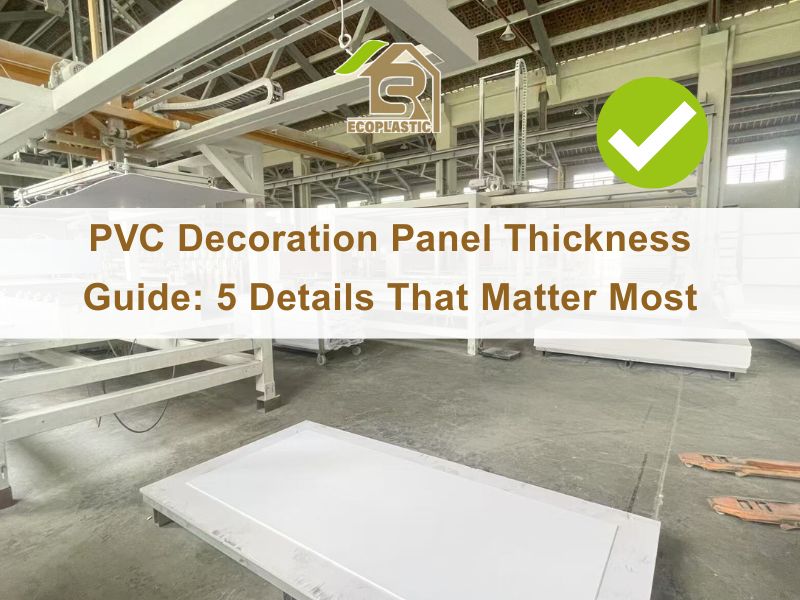PVC Decoration Panel Thickness Guide: 5 Details That Matter Most
Thickness.
Sounds simple. But in PVC decoration panels, it’s the quiet factor that decides how the product behaves months, even years later.
People often start with design, texture, color. All good. But if the thickness is wrong, the rest doesn’t hold up. You’ll get warping, cracks, or panels that just feel flimsy. Here’s how to read thickness the right way — and five checks that actually tell you if a panel is worth buying.
1. Thickness range — match it to the job
PVC decoration panels come in many sizes. From 3 mm thin skins to 12 mm solid boards. Sometimes more for custom projects.
3–5 mm → quick decorative overlays. Not meant for knocks.
6–8 mm → home walls, small shops, areas where people will brush past but not hit hard.
10–12 mm+ → busy spaces. Hotels, corridors, commercial kitchens. Panels that take impacts and stay flat.
Pick too thin for a high-traffic wall? It won’t last. You’ll see dents before the year is over.
2. Consistency across the board
Good panels keep their thickness from one end to the other. Bad ones don’t.
Why it matters:
Uneven edges make installation harder.
Thin spots become weak spots.
Surface can ripple once mounted.
You don’t need fancy equipment to check. A simple caliper. Measure a few points. Or just run your hand flat — you’ll feel dips.
3. Density and wall thickness ratio
PVC panels aren’t solid. They have hollow or foamed cores. The strength comes from the outer walls.
Thicker outer walls = better resistance to bending and impact.
Industry rule of thumb: for an 8 mm panel, you want at least 1.0–1.2 mm on each side. Less than that, and you’re paying for air.
4. Weight tells a story
Heavier isn’t always better. Too heavy, and you’re fighting the install. Too light, and you might have a panel puffed with foam but no real structure.
Modern panels can be thick yet light enough to carry in stacks. That balance is what you want. Enough substance to feel sturdy in hand, but not so much it strains the wall.
5. Longevity is tied to thickness
Real-world use shows it. A 10 mm PVC panel in a hotel hallway will survive twice, maybe three times as long as a 5 mm one. It takes more knocks before showing damage.
Thicker panels also hold shape better in heat or humidity. And yes — they cut a bit more noise between rooms.
Quick buyer notes
Ask for samples. Bend them slightly — good panels resist without cracking.
Check fire and impact ratings. They often correlate with proper thickness.
Stick with suppliers who publish tolerances. Those numbers matter.

Thickness isn’t just a number on a spec sheet — it’s the foundation that determines the performance, appearance, and lifespan of PVC decoration panels. Pick the wrong thickness, and no matter how beautiful the design is, the project won’t hold up. Choose it right, and your decoration stays clean, straight, and sturdy for years.
When selecting PVC panels for decoration, the strength of your supplier really matters. Ecolplastic is a professional manufacturer based in China with years of experience in PVC panel production. Their factory floor workers and quality control team are highly skilled, and quality management is thorough.
We offer a wide range of thicknesses, colors, and sizes — and can customize according to your project needs. With a stable raw material supply and large production capacity, Ecolplastic ensures on-time delivery for international orders and consistent quality.
If you care about cost-effectiveness, need reliable bulk supply, and dependable after-sales service, Ecolplastic’s expertise in PVC decoration panels makes them a long-term partner you can trust.


